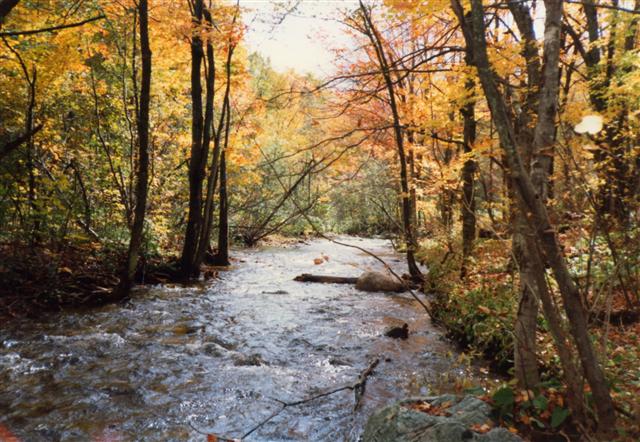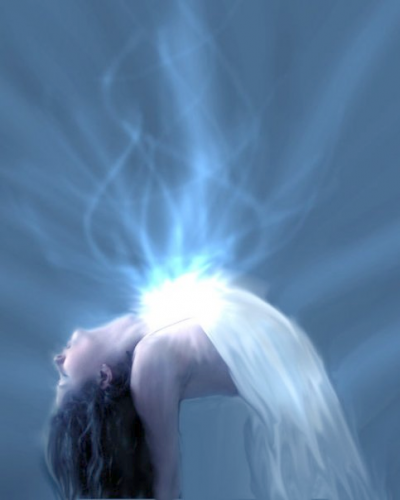Not a leaf fluttered. It was so quiet and still that every sound was clear and distinct. Attending to the movement of thought/emotion in the mirror of nature as the stream flowed quietly by at one’s feet, the stillness outside penetrated and became stillness inside.
 The ‘I’ dissolved; there was only listening and watching. A long, thick stick broke loose from the bank a short distance upstream and floated by on the silent current, turning in slow motion as if in the vacuum of space.
The ‘I’ dissolved; there was only listening and watching. A long, thick stick broke loose from the bank a short distance upstream and floated by on the silent current, turning in slow motion as if in the vacuum of space.
The mind-as-thought, with its reactions of memory, association and interpretation, had folded its wings in upon itself. Reaction at every level ceased. There was only listening and watching. The silent mind/brain was transported to a dimension beyond time/space.
The moment after the long stick in the current passed, a loud cracking high in the branches across the creek began. For some seconds the still air reverberated with the snapping of a giant limb until it crashed, unseen, to the ground.
Immediately after, a nearby hawk began a piercing call. Its cries went deep, unearthing previously unseen levels of primal fear. It was warning of darkness, which came later that night. I still didn’t see it until after the fact.
Can the self completely and irrevocably die while one is fully alive? I for one don’t want to wait until physical death for psychological death.
Psychological death sounds scary. Why would anyone want it?
Our deepest fear is the total loss of the continuity of the self, which we believe is synonymous with death. Hence the idiocy of “uploading” our consciousness onto the Net, and achieving immortality. But that would be neither life nor death, just a hellish continuity of the self.
Certainly the self ends when we physically expire. But it also happens in deeper states of meditation. (Interestingly, not during sleep, at least REM sleep.)
One way or another, death is the great fact of life. We all die, and the programs of our paltry selves are absorbed into a larger stream.
There are four possibilities as I see it. First, there’s the prevailing view that there’s nothing—we simply cease to exist completely when we die.
You would think that would imbue life and living with more importance and vibrancy, but it has done exactly the opposite, leading many people to believe there’s no meaning to life.
The second possibility is that by willfully wasting our lives and not caring about anyone or anything during life, we become absorbed into the larger man-made darkness, beyond the reach of grace and rebirth. In other words, there’s no heaven, but there’s a hell, a continuation of how we’ve lived on earth (without implying punishment and permanence).
Third, if we’re a decent person and have done our best, we’re reborn in some human form to learn what we wouldn’t or couldn’t learn in the previous lifetime. In this view, “reincarnation is a fact, but not the truth.”
Lastly, if we liberate ourselves from the self, which is the source of the disorder in the world, we join the vast stream of life when we die, in which there is no death at all. In other words, the greatest paradox is that psychological death is actually the path to immortality.
I feel the last one is true. To allow one’s brain and body to be immersed in silence and emptiness is to know the ground of all being. It is to psychologically die, at least for a little while.
Strange as it sounds, being has its wellspring in non-being. All matter, energy and life are held in an infinite cup of emptiness.
We are born from emptiness and wholeness, and when we die we flow back into emptiness and wholeness. Why then do we fear death, when the deathless is the ground of being?
Buddhism, as it has been imported from the East and grafted onto the individualism of the West, has only served to reinforce the self. That’s a very strange thing, since the essence of the Buddha’s teachings is the complete negation of self.
So why has this happened? Twenty years ago if you called someone a narcissist, it meant they were pathologically ill. Nowadays narcissism is de rigueur, and America has a narcissist as POTUS, which now sounds onomatopoetic.
Extreme self-centeredness has been normalized, and not just in American culture. This is the crisis of human consciousness.
Dissolving the self, we not only free ourselves; we contribute to the liberation of humanity.
Martin LeFevre

